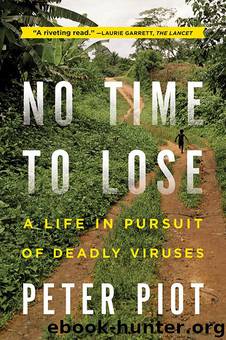No Time to Lose: A Life in Pursuit of Deadly Viruses by Piot Peter

Author:Piot, Peter [Piot, Peter]
Language: eng
Format: epub
Publisher: W. W. Norton & Company
Published: 2012-05-28T00:00:00+00:00
AFTER A WHILE I found that I was thriving at GPA, somewhat to my surprise, and that I was feeling useful. People took my advice seriously, and the officials I met (and hoped to influence) could have, at the very least, enormous nuisance power and, at best, could make important decisions. Brokering ethical guidelines for vaccine trials or recommending treatment guidelines for STDs meant that I could actually influence public health policy and shift health practice. Each step might be slow, but the ripples it created were extremely broad and their impact was real.
I started to become interested in decision-making at the highest level. I could see how political AIDS is, because it’s not just a matter of making sure the labs function and the condoms are available and the drugs stay cold: you need the political heavy lifting to have an impact. Budgets must be voted, and political will and leadership are vital. I was still planning to go back to Antwerp, because I had no desire to become part of the WHO system. But I felt that, here and now, I could deliver something very specific: rigorously constructed research projects that bound together medical queries with social science to generate the best possible evidence for policy and decision making on AIDS. When Mike Merson asked me to stay on for another year, I agreed to do it.
Mike was by now embroiled in discussions with the UN Development Programme (UNDP), the World Bank, UNICEF, UNESCO, and UNFPA (the world population agency), along with a group of representatives from major donor countries and nongovernmental organizations, about how to transform the Global Programme on AIDS. This task force, set up in April 1992 by the GPA board, was frustrated by the lack of coordination of international work on AIDS. The positive news was the that the big agencies of the UN system had begun to set up AIDS programs when AIDS started to affect their areas of activity, but as is typical of the international development system, they were doing this separately, almost in competition.
There were some strong personalities in charge of this process: Jim Sherry at UNICEF, Elizabeth Reid at UNDP. They had their own views on what to do and frankly they worked at loggerheads, laying down different policy recommendations, sometimes accusing Mike Merson of not understanding the epidemic. And all the agencies were going to the same donors and saying give the money to my agency, not to his. The donor countries, meanwhile, could see that WHO’s political and administrative modes of doing business were creating enormous inefficiencies, because routing everything through regional offices meant that a lot of money was stuck there. There was no question of corruption but often sloppy management and entrenchment: “If I’m not running this project, it won’t happen.” At the same time, major development agencies such as USAID and the UK’s Department for International Development were setting up their own AIDS programs and were reluctant to channel their money through the multilateral
Download
This site does not store any files on its server. We only index and link to content provided by other sites. Please contact the content providers to delete copyright contents if any and email us, we'll remove relevant links or contents immediately.
Periodization Training for Sports by Tudor Bompa(8240)
Why We Sleep: Unlocking the Power of Sleep and Dreams by Matthew Walker(6688)
Paper Towns by Green John(5168)
The Immortal Life of Henrietta Lacks by Rebecca Skloot(4569)
The Sports Rules Book by Human Kinetics(4374)
Dynamic Alignment Through Imagery by Eric Franklin(4201)
ACSM's Complete Guide to Fitness & Health by ACSM(4043)
Kaplan MCAT Organic Chemistry Review: Created for MCAT 2015 (Kaplan Test Prep) by Kaplan(3994)
Livewired by David Eagleman(3757)
Introduction to Kinesiology by Shirl J. Hoffman(3755)
The Death of the Heart by Elizabeth Bowen(3599)
The River of Consciousness by Oliver Sacks(3590)
Alchemy and Alchemists by C. J. S. Thompson(3506)
Bad Pharma by Ben Goldacre(3414)
Descartes' Error by Antonio Damasio(3264)
The Emperor of All Maladies: A Biography of Cancer by Siddhartha Mukherjee(3135)
The Gene: An Intimate History by Siddhartha Mukherjee(3086)
The Fate of Rome: Climate, Disease, and the End of an Empire (The Princeton History of the Ancient World) by Kyle Harper(3049)
Kaplan MCAT Behavioral Sciences Review: Created for MCAT 2015 (Kaplan Test Prep) by Kaplan(2974)
